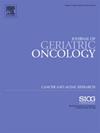Nurse navigation for older adults with cancer: A scoping review
IF 3
3区 医学
Q3 GERIATRICS & GERONTOLOGY
引用次数: 0
Abstract
Introduction
Nurse navigation is important in cancer care, with prior studies indicating improvements in quality of life and symptom management. We sought to understand the scope of literature on nurse navigation for older adults with cancer. Specifically, we aimed to understand the characteristics, roles, and services nurse navigators provide for older adults with cancer.
Materials and Methods
Using the updated Arksey and O'Malley scoping review method, we conducted a scoping review of the literature with searches in PubMed, CINAHL, Embase, and Cochrane. Two reviewers independently screened studies following the inclusion and exclusion criteria. We included studies: (1) published between 2000 and 2024 in English;(2) with participants with cancer aged ≥60 years or mean or median age ≥ 60 years, or a sub-group analysis of those aged ≥60; and (3) navigation provided by a nurse. We excluded grey literature and studies on nurse navigation in cancer screening.
Results
Our search and citation screening yielded 1291 and 748 studies, respectively, of which we screened 1528 titles/abstracts and 257 full-text articles. We identified 29 studies meeting inclusion criteria which describe nurse navigation for older adults with cancer addressing several outcomes including patient experience, satisfaction, and timeliness. About half (14/29) of the included studies addressed older adults specifically.
Discussion
Nurse navigation shows promise in bridging critical gaps in the care of older adults with cancer. Our findings highlight the need for further evidence about models of care and development of practice-guiding documents to enhance the effectiveness of nurse navigation for older adults with cancer.
老年癌症患者的护士导航:范围回顾
导读护士导航在癌症护理中很重要,先前的研究表明生活质量和症状管理的改善。我们试图了解关于老年癌症患者护士导航的文献范围。具体来说,我们旨在了解护士导航员为老年癌症患者提供的特征、角色和服务。材料和方法使用更新的Arksey和O'Malley范围综述方法,我们对PubMed、CINAHL、Embase和Cochrane的文献进行了范围综述。两位审稿人按照纳入和排除标准独立筛选研究。我们纳入的研究:(1)发表于2000年至2024年间的英文研究;(2)参与者年龄≥60岁或平均或中位年龄≥60岁的癌症患者,或年龄≥60岁的亚组分析;(3)由护士指导。我们排除了灰色文献和癌症筛查中护士导航的研究。结果我们的检索和引文筛选分别获得1291篇和748篇研究,其中我们筛选了1528篇标题/摘要和257篇全文文章。我们确定了29项符合纳入标准的研究,这些研究描述了老年癌症患者的护士导航,解决了包括患者体验、满意度和及时性在内的几个结果。大约一半(14/29)的纳入研究专门针对老年人。护士导航有望弥合老年癌症患者护理中的关键空白。我们的研究结果强调需要进一步的证据来证明护理模式和实践指导文件的发展,以提高老年癌症患者护士导航的有效性。
本文章由计算机程序翻译,如有差异,请以英文原文为准。
求助全文
约1分钟内获得全文
求助全文
来源期刊

Journal of geriatric oncology
ONCOLOGY-GERIATRICS & GERONTOLOGY
CiteScore
5.30
自引率
10.00%
发文量
379
审稿时长
80 days
期刊介绍:
The Journal of Geriatric Oncology is an international, multidisciplinary journal which is focused on advancing research in the treatment and survivorship issues of older adults with cancer, as well as literature relevant to education and policy development in geriatric oncology.
The journal welcomes the submission of manuscripts in the following categories:
• Original research articles
• Review articles
• Clinical trials
• Education and training articles
• Short communications
• Perspectives
• Meeting reports
• Letters to the Editor.
 求助内容:
求助内容: 应助结果提醒方式:
应助结果提醒方式:


